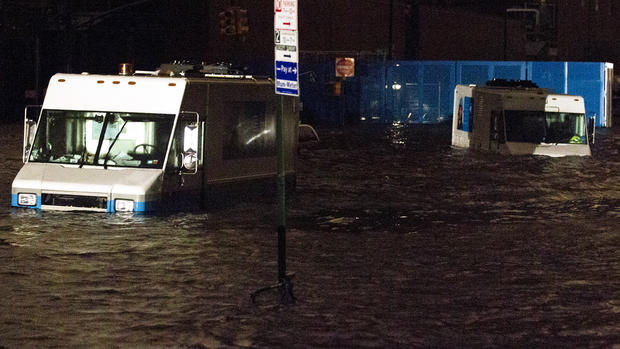Are you prepared for Hurricane Sandy? CDC has tips
Hurricane Sandy is bearing down on the East Coast, with the storm gaining speed Sunday night and into Monday.
By 8:00 a.m. ET on Oct 29, the storm was centered about 310 miles south-southeast of New York City. The storm's winds extend up to 175 miles from the storm's center, with tropical storm-force winds extended outward up to 485 miles.
With potential for devastation and high risk for injury, the Centers for Disease Control and Prevention wants to make sure Americans in the storm's path are prepared so they can reduce risk for any health hazards.
If your city is under a hurricane watch or warning, the CDC says you should learn about your local community's emergency plans, including location of emergency shelters and evacuation routes.
Within the home, make sure you identify potential home hazards and know how to secure them before the storm strikes: Be prepared to turn off electrical power when there is standing water, fallen power lines, or before you evacuate. Turn off gas and water supplies before you evacuate and make sure structurally unstable building materials are secured. It is also good practice to keep a fire extinguisher and make sure your family knows where it is and how to use it.
Have your important documents handy including insurance policies, wills, licenses, stocks and important medical documents that you might need to grab in a pinch.
In addition to important documents, the CDC recommends you stock your home with emergency supplies.
They are:
- Several clean containers of water, large enough for a three-to-five day supply -- about five gallons per person
- A supply of non-perishable foods that can last up to five days. Non-perishable foods may include peanut butter, protein bars, dry cereal or granola, nuts, crackers, canned juices and ready-to-eat canned meats, fruits and vegetables.
- A first aid kit and manual.
- A battery-powered radio, flashlights, and extra batteries.
- Sleeping bags, extra blankets.
- Water-purifying supplies, such as chlorine or iodine tablets or unscented, ordinary household chlorine bleach. Here are tips on how to purify water with bleach.
- Prescription medicines and special medical needs.
- Baby food and/or prepared formula, diapers, and other baby supplies.
- Disposable cleaning cloths, such as "baby wipes" for the whole family to use in case bathing facilities are not available.
- Personal hygiene supplies, such as soap, toothpaste, sanitary napkins, etc.
In the case of an evacuation, make sure you have a full tank of gas ready in a vehicle or transportation plans with friends or family. A roadside-emergency kit with food, flares, booster cables, maps, tools, a first aid kit, fire extinguisher, sleeping bags, and other supplies are recommended by the CDC. Before leaving, make sure the windows are covered and set the refrigerator and freezers to the coolest possible temperatures.
If you are not ordered to leave, stay indoors and avoid the calmed "eye of the storm" that can pass quickly, leaving you outside at risk. The majority of hurricane-related injuries are caused by flying glass and other debris. Stay away from windows and doors and seek shelter in a bathroom and basement if possible.
Carbon monoxide poisoning is also a potential risk during a hurricane: Don't use a generator, pressure washer, charcoal grill, camp stove, or other gasoline- or charcoal-burning device inside your home, basement, or garage or less than 20 feet from any window, door, or vent, the CDC recommends.
Humans aren't the only ones that need to be prepared. Most emergency shelters won't admit pets, so the CDC recommends contacting a local animal shelter which could be found through Petfinder's Shelter Center or your local government.
The CDC has more on health and safety tips during hurricanes.
